In this assignment you are to implement ArrayBag as a generi
In this assignment you are to implement ArrayBag as a generic class with a type parameter T for the elements in the bag. I am having an issue with a specific part which I will document below.
One of the steps requires you create a toString() method such that it returns a String representation of the whole bag concatenating the string representations of the data[k] array entries (data[k] must call its own toString( )). In case the returned message is printed each bag element must be in a new line on the console
here is what I have for this method (below)...however, during the implementation of the method in the Driver class, it does not work correctly.
public void toString(T[] inputArray) {
// display array elements
for (T element : inputArray)
System.out.printf(element.toString());
System.out.println();
}
Solution
public class ArrayBag<E> implements Cloneable
{
// Invariant of the ArrayBag class:
// 1. The number of elements in the bag is in the instance variable
// manyItems, which is no more than data.length.
// 2. For an empty bag, we do not care what is stored in any of data;
// for a non-empty bag, the elements in the bag are stored in data[0]
// through data[manyItems-1], and we don\'t care what\'s in the
// rest of data.
private Object[ ] data;
private int manyItems;
/**
* Initialize an empty bag with an initial capacity of 10. Note that the
* addItem method works efficiently (without needing more
* memory) until this capacity is reached.
* @postcondition
* This bag is empty and has an initial capacity of 10.
* @exception OutOfMemoryError
* Indicates insufficient memory for:
* new Object[10].
**/
public ArrayBag( )
{
final int INITIAL_CAPACITY = 10;
manyItems = 0;
data = new Object[INITIAL_CAPACITY];
}
/**
* Initialize an empty bag with a specified initial capacity. Note that the
* addItem method works efficiently (without needing more
* memory) until this capacity is reached.
* @param initialCapacity
* the initial capacity of this bag
* @precondition
* initialCapacity is non-negative.
* @postcondition
* This bag is empty and has the given initial capacity.
* @exception IllegalArgumentException
* Indicates that initialCapacity is negative.
* @exception OutOfMemoryError
* Indicates insufficient memory for: new Object[initialCapacity].
**/
public ArrayBag(int initialCapacity)
{
if (initialCapacity < 0)
throw new IllegalArgumentException
(\"The initialCapacity is negative: \" + initialCapacity);
data = new Object[initialCapacity];
manyItems = 0;
}
/**
* Add a new element to this bag. If the new element would take this
* bag beyond its current capacity, then the capacity is increased
* before adding the new element.
* @param element
* the new element that is being inserted
* @postcondition
* A new copy of the element has been added to this bag.
* @exception OutOfMemoryError
* Indicates insufficient memory for increasing the bag\'s capacity.
* @note
* An attempt to increase the capacity beyond
* Integer.MAX_VALUE will cause the bag to fail with an
* arithmetic overflow.
**/
public void add(E element)
{
if (manyItems == data.length)
{ // Ensure twice as much space as we need.
ensureCapacity((manyItems + 1)*2);
}
data[manyItems] = element;
manyItems++;
}
/**
* Add the contents of another bag to this bag.
* @param addend
* a bag whose contents will be added to this bag
* @precondition
* The parameter, addend, is not null.
* @postcondition
* The elements from addend have been added to this bag.
* @exception NullPointerException
* Indicates that addend is null.
* @exception OutOfMemoryError
* Indicates insufficient memory to increase the size of the bag.
* @note
* An attempt to increase the capacity beyond
* Integer.MAX_VALUE will cause an arithmetic overflow
* that will cause the bag to fail. Such large collections should use
* a different bag implementation.
**/
public void addAll(ArrayBag<E> addend)
{
// If addend is null, then a NullPointerException is thrown.
// In the case that the total number of items is beyond
// Integer.MAX_VALUE, there will be an arithmetic overflow and
// the bag will fail.
ensureCapacity(manyItems + addend.manyItems);
System.arraycopy(addend.data, 0, data, manyItems, addend.manyItems);
manyItems += addend.manyItems;
}
/**
* Add new elements to this bag. If the new elements would take this
* bag beyond its current capacity, then the capacity is increased
* before adding the new elements.
* @param elements
* (a variable-arity argument)
* one or more new elements that are being inserted
* @postcondition
* A new copy of the element has been added to this bag.
* @exception OutOfMemoryError
* Indicates insufficient memory for increasing the bag\'s capacity.
* @note
* An attempt to increase the capacity beyond
* Integer.MAX_VALUE will cause the bag to fail with an
* arithmetic overflow.
**/
@SuppressWarnings(\"unchecked\")
public void addMany(E... elements)
{
if (manyItems + elements.length > data.length)
{ // Ensure twice as much space as we need.
ensureCapacity((manyItems + elements.length)*2);
}
System.arraycopy(elements, 0, data, manyItems, elements.length);
manyItems += elements.length;
}
/**
* Generate a copy of this bag.
* @return
* The return value is a copy of this bag. Subsequent changes to the
* copy will not affect the original, nor vice versa.
* @exception OutOfMemoryError
* Indicates insufficient memory for creating the clone.
**/
@SuppressWarnings(\"unchecked\")
public ArrayBag<E> clone( )
{ // Clone an ArrayBag object.
ArrayBag<E> answer;
try
{
answer = (ArrayBag<E>) super.clone( );
}
catch (CloneNotSupportedException e)
{ // This exception should not occur. But if it does, it would probably
// indicate a programming error that made super.clone unavailable.
// The most common error would be forgetting the \"Implements Cloneable\"
// clause at the start of this class.
throw new RuntimeException
(\"This class does not implement Cloneable\");
}
answer.data = data.clone( );
return answer;
}
/**
* Accessor method to count the number of occurrences of a particular element
* in this bag.
* @param target
* the element that needs to be counted
* @return
* the number of times that target occurs in this bag
**/
public int countOccurrences(E target)
{
int answer;
int index;
answer = 0;
for (index = 0; index < manyItems; index++)
if (target == data[index])
answer++;
return answer;
}
/**
* Change the current capacity of this bag.
* @param minimumCapacity
* the new capacity for this bag
* @postcondition
* This bag\'s capacity has been changed to at least minimumCapacity.
* If the capacity was already at or greater than minimumCapacity,
* then the capacity is left unchanged.
* @exception OutOfMemoryError
* Indicates insufficient memory for: new Object[minimumCapacity].
**/
public void ensureCapacity(int minimumCapacity)
{
Object biggerArray[ ];
if (data.length < minimumCapacity)
{
biggerArray = new Object[minimumCapacity];
System.arraycopy(data, 0, biggerArray, 0, manyItems);
data = biggerArray;
}
}
/**
* Accessor method to get the current capacity of this bag.
* The add method works efficiently (without needing
* more memory) until this capacity is reached.
* @return
* the current capacity of this bag
**/
public int getCapacity( )
{
return data.length;
}
/**
* Accessor method to retrieve a random element from this bag.
* @precondition
* This bag is not empty.
* @return
* a randomly selected element from this bag
* @exception IllegalStateException
* Indicates that the bag is empty.
**/
@SuppressWarnings(\"unchecked\")
public E grab( )
{
int i;
if (manyItems == 0)
throw new IllegalStateException(\"Bag size is zero\");
i = (int)(Math.random( ) * manyItems) + 1;
return (E) data[i];
}
/**
* Remove one copy of a specified element from this bag.
* @param target
* the element to remove from the bag
* @return
* If target was found in the bag, then one copy of
* target has been removed and the method returns true.
* Otherwise the bag remains unchanged and the method returns false.
**/
public boolean remove(E target)
{
int index; // The location of target in the data array.
// First, set index to the location of target in the data array,
// which could be as small as 0 or as large as manyItems-1; If target
// is not in the array, then index will be set equal to manyItems;
if (target == null)
{ // Find the first occurrence of the null reference in the bag.
index = 0;
while ((index < manyItems) && (data[index] != null))
index++;
}
else
{ // Find the first occurrence of the target in the bag.
index = 0;
while ((index < manyItems) && (!target.equals(data[index])))
index++;
}
if (index == manyItems)
// The target was not found, so nothing is removed.
return false;
else
{ // The target was found at data[index].
// So reduce manyItems by 1 and copy the last element onto data[index].
manyItems--;
data[index] = data[manyItems];
data[manyItems] = null;
return true;
}
}
/**
* Determine the number of elements in this bag.
* @return
* the number of elements in this bag
**/
public int size( )
{
return manyItems;
}
/**
* Reduce the current capacity of this bag to its actual size (i.e., the
* number of elements it contains).
* @postcondition
* This bag\'s capacity has been changed to its current size.
* @exception OutOfMemoryError
* Indicates insufficient memory for altering the capacity.
**/
public void trimToSize( )
{
Object[ ] trimmedArray;
if (data.length != manyItems)
{
trimmedArray = new Object[manyItems];
System.arraycopy(data, 0, trimmedArray, 0, manyItems);
data = trimmedArray;
}
}
/**
* Create a new bag that contains all the elements from two other bags.
* @param b1
* the first of two bags
* @param b2
* the second of two bags
* @param <E>
* the type of the elements in the bag
* @precondition
* Neither b1 nor b2 is null, and
* b1.getCapacity( ) + b2.getCapacity( ) <= Integer.MAX_VALUE.
* @return
* the union of b1 and b2
* @exception NullPointerException
* Indicates that one of the arguments is null.
* @exception OutOfMemoryError
* Indicates insufficient memory for the new bag.
* @note
* An attempt to create a bag with a capacity beyond
* Integer.MAX_VALUE will cause an arithmetic overflow
* that will cause the bag to fail. Such large collections should use
* a different bag implementation.
**/
public static <E> ArrayBag<E> union(ArrayBag<E> b1, ArrayBag<E> b2)
{
// If either b1 or b2 is null, then a NullPointerException is thrown.
// In the case that the total number of items is beyond
// Integer.MAX_VALUE, there will be an arithmetic overflow and
// the bag will fail.
ArrayBag<E> answer = new ArrayBag<E>(b1.getCapacity( ) + b2.getCapacity( ));
System.arraycopy(b1.data, 0, answer.data, 0, b1.manyItems);
System.arraycopy(b2.data, 0, answer.data, b1.manyItems, b2.manyItems);
answer.manyItems = b1.manyItems + b2.manyItems;
return answer;
}
}
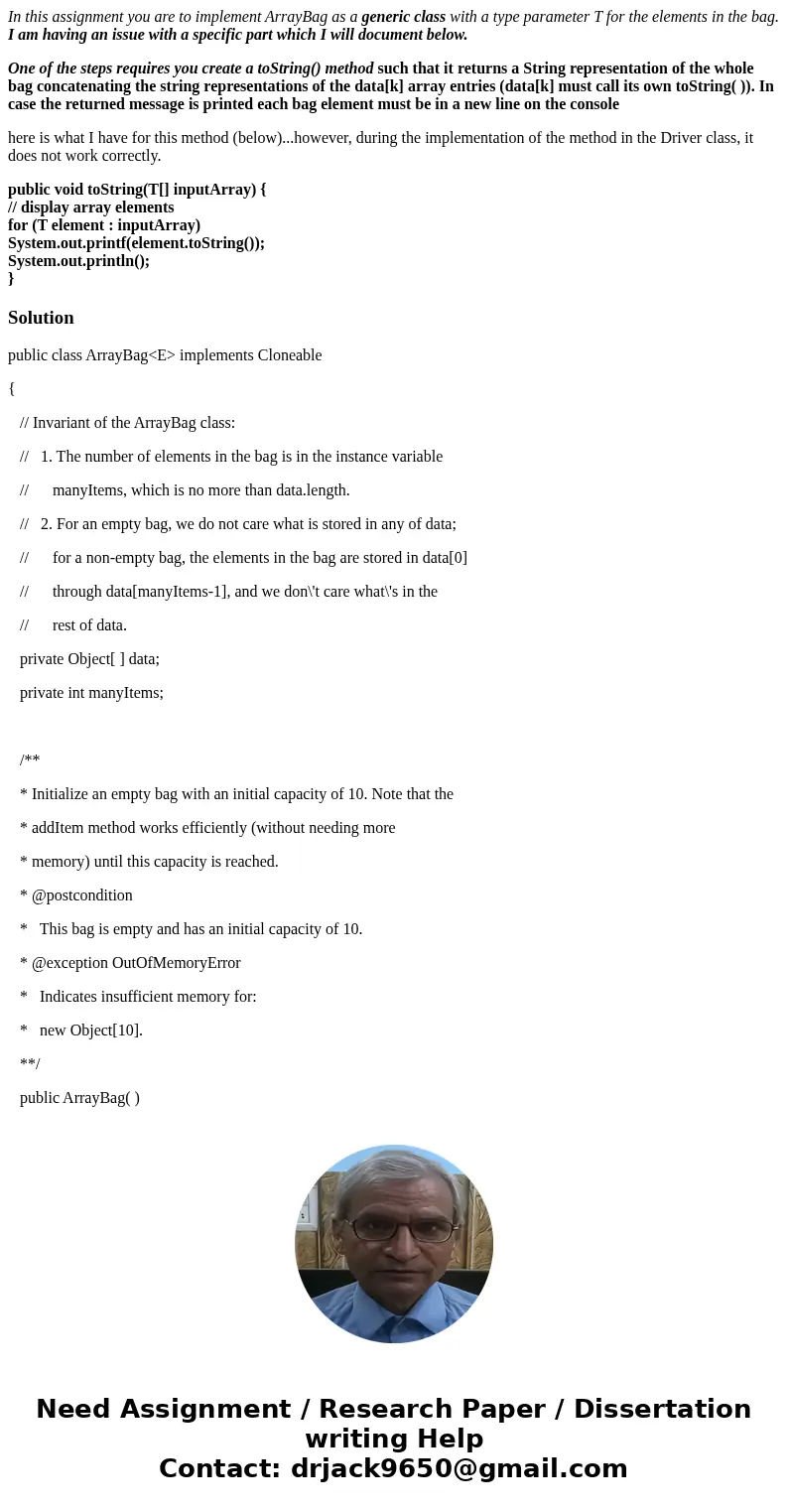
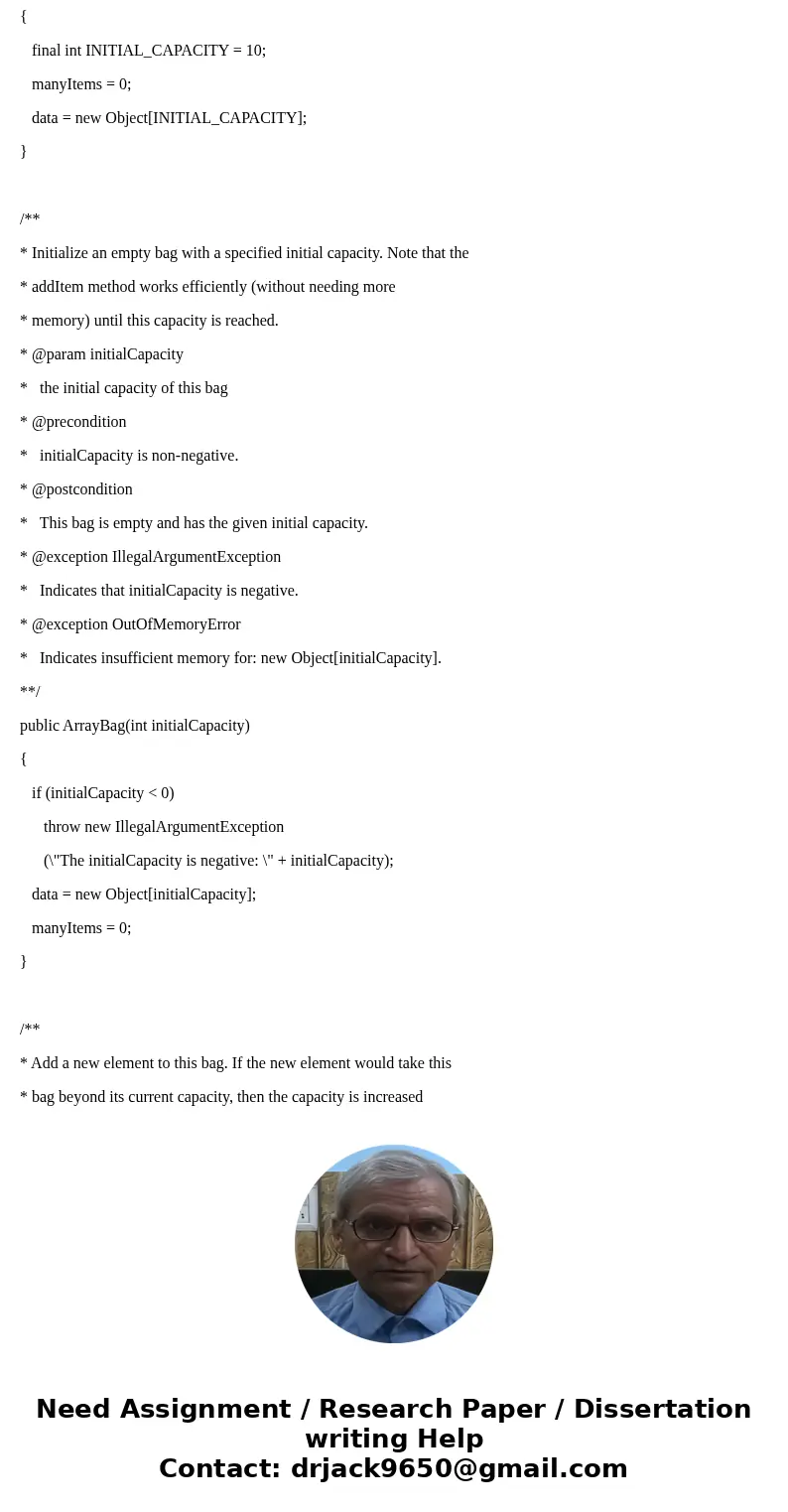
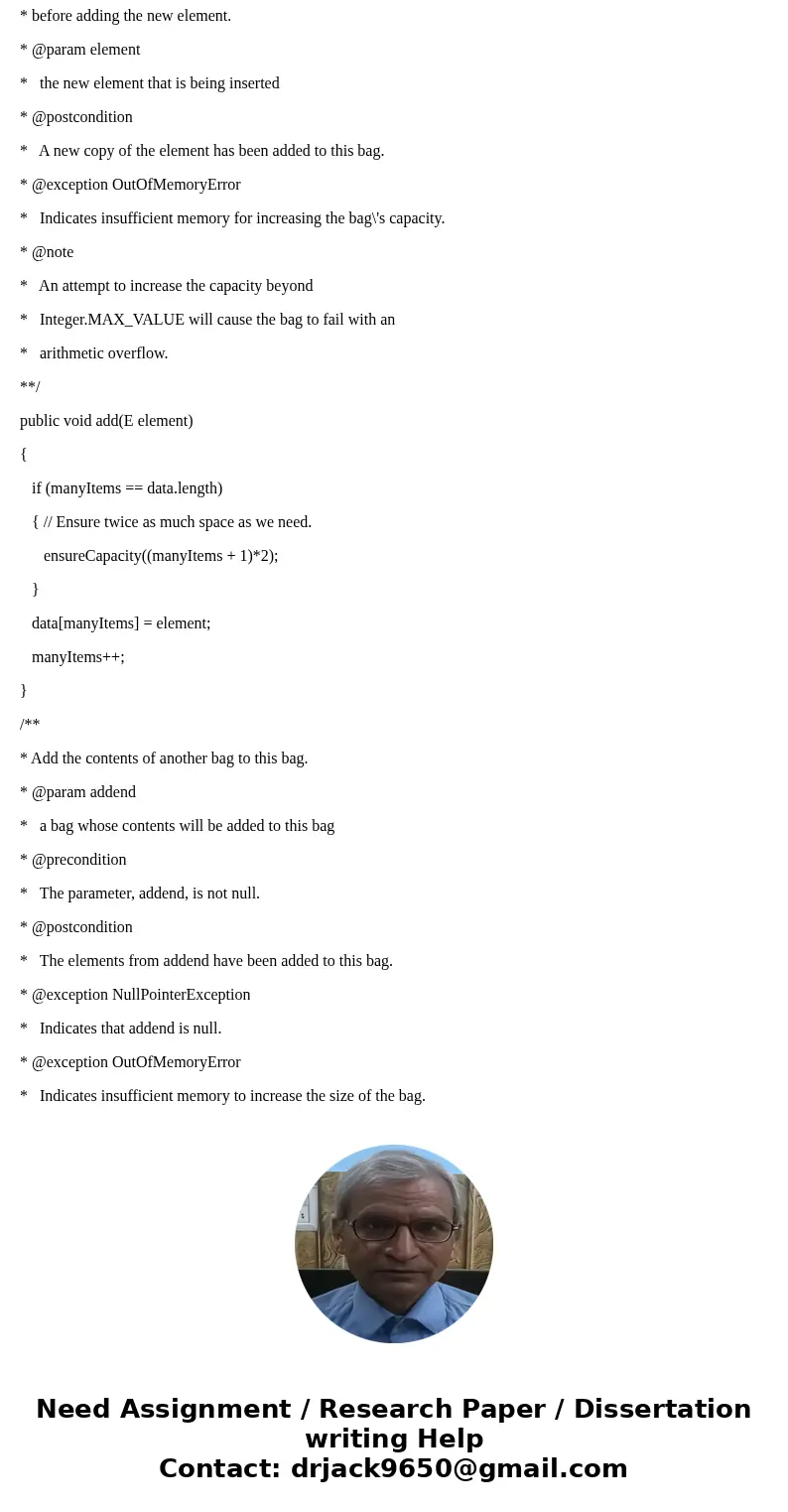
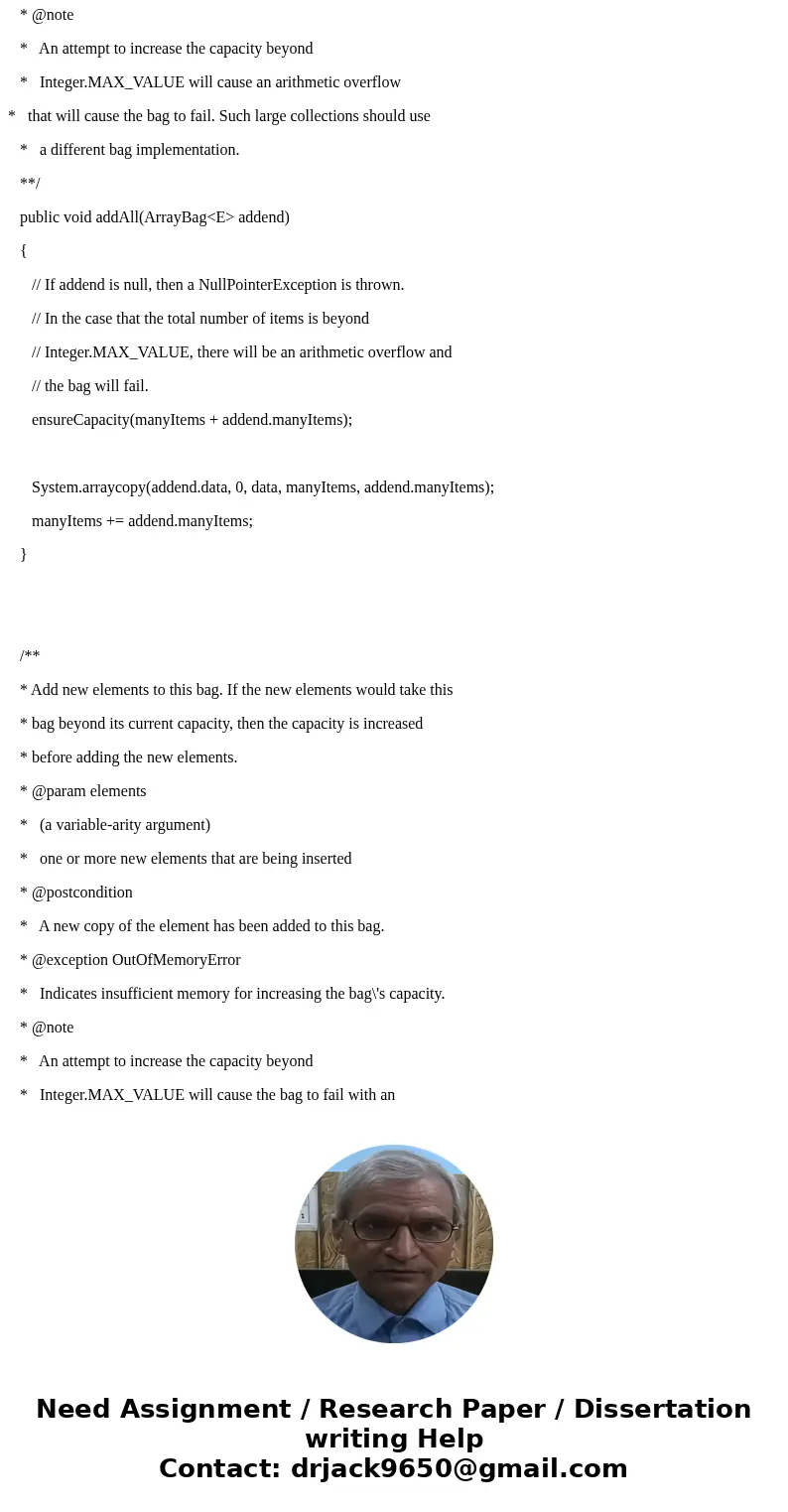
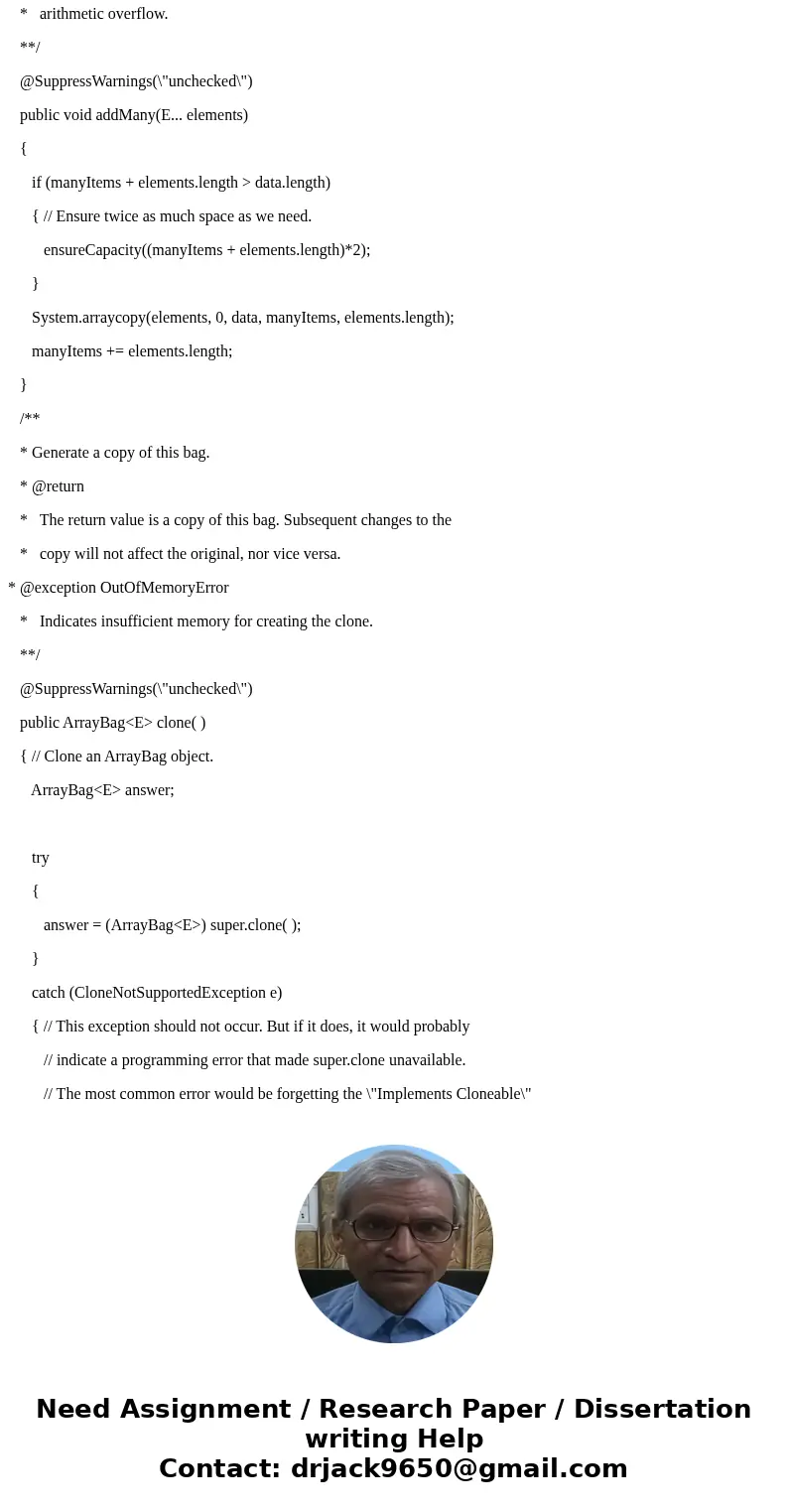
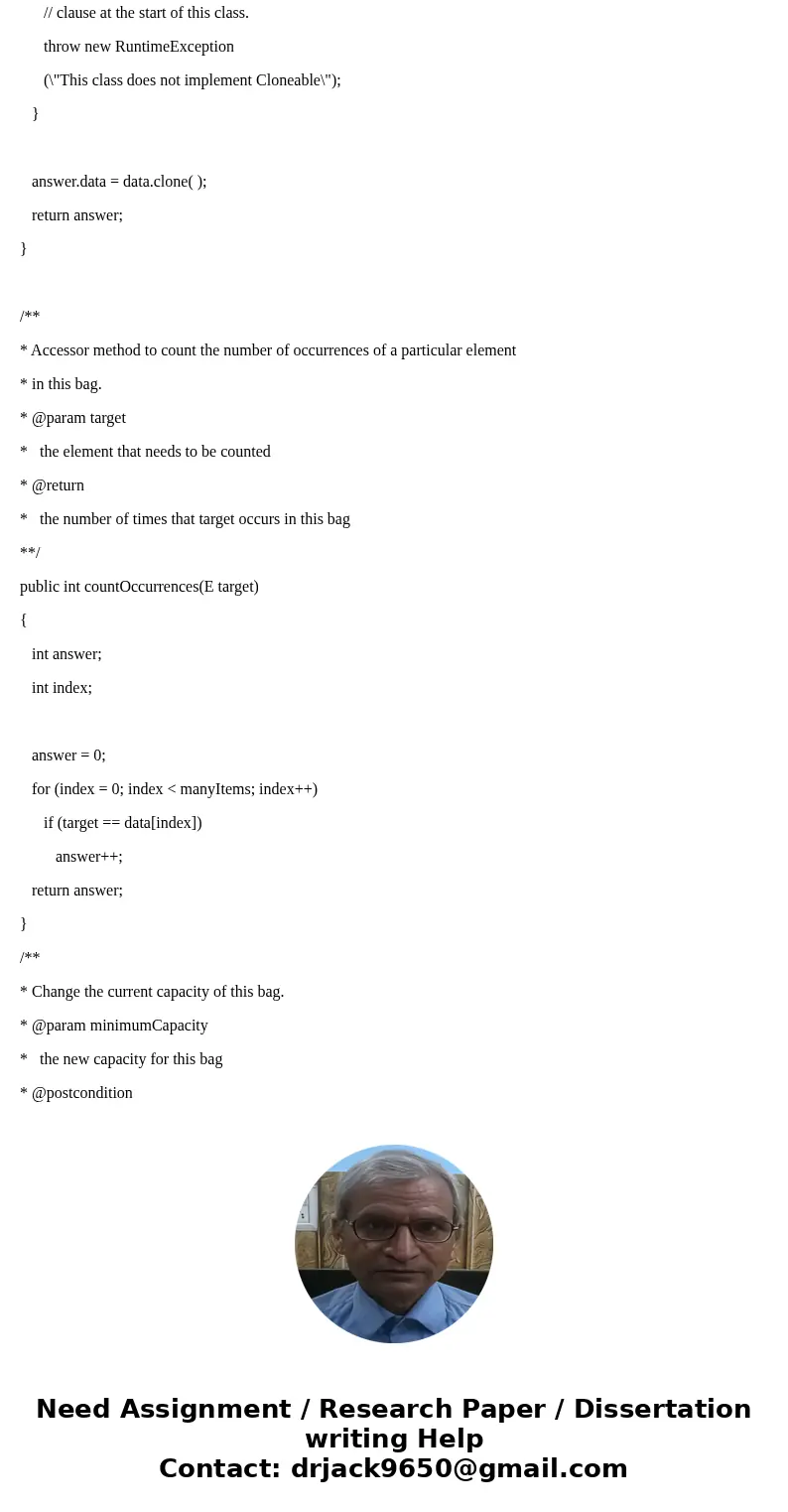
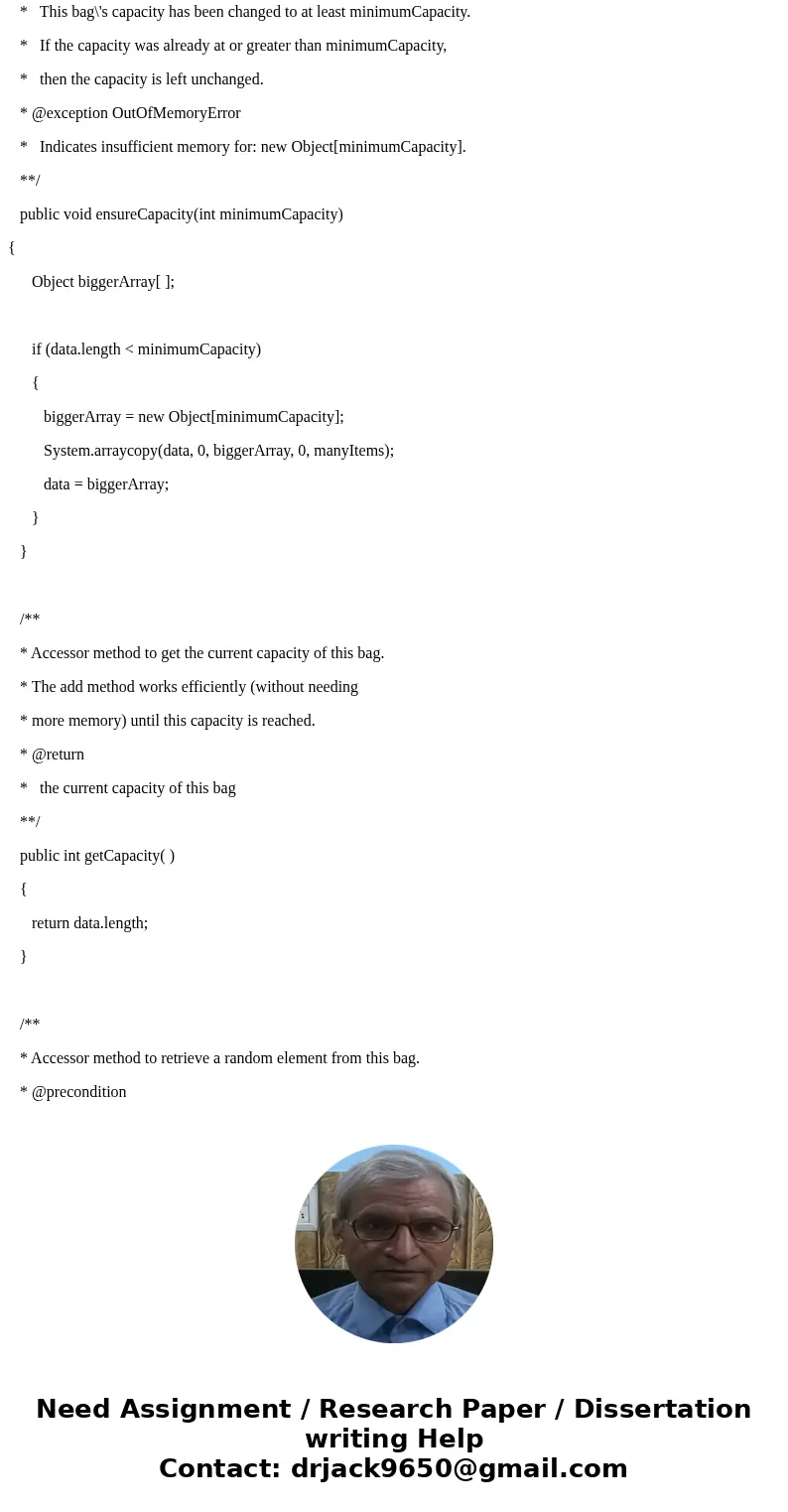
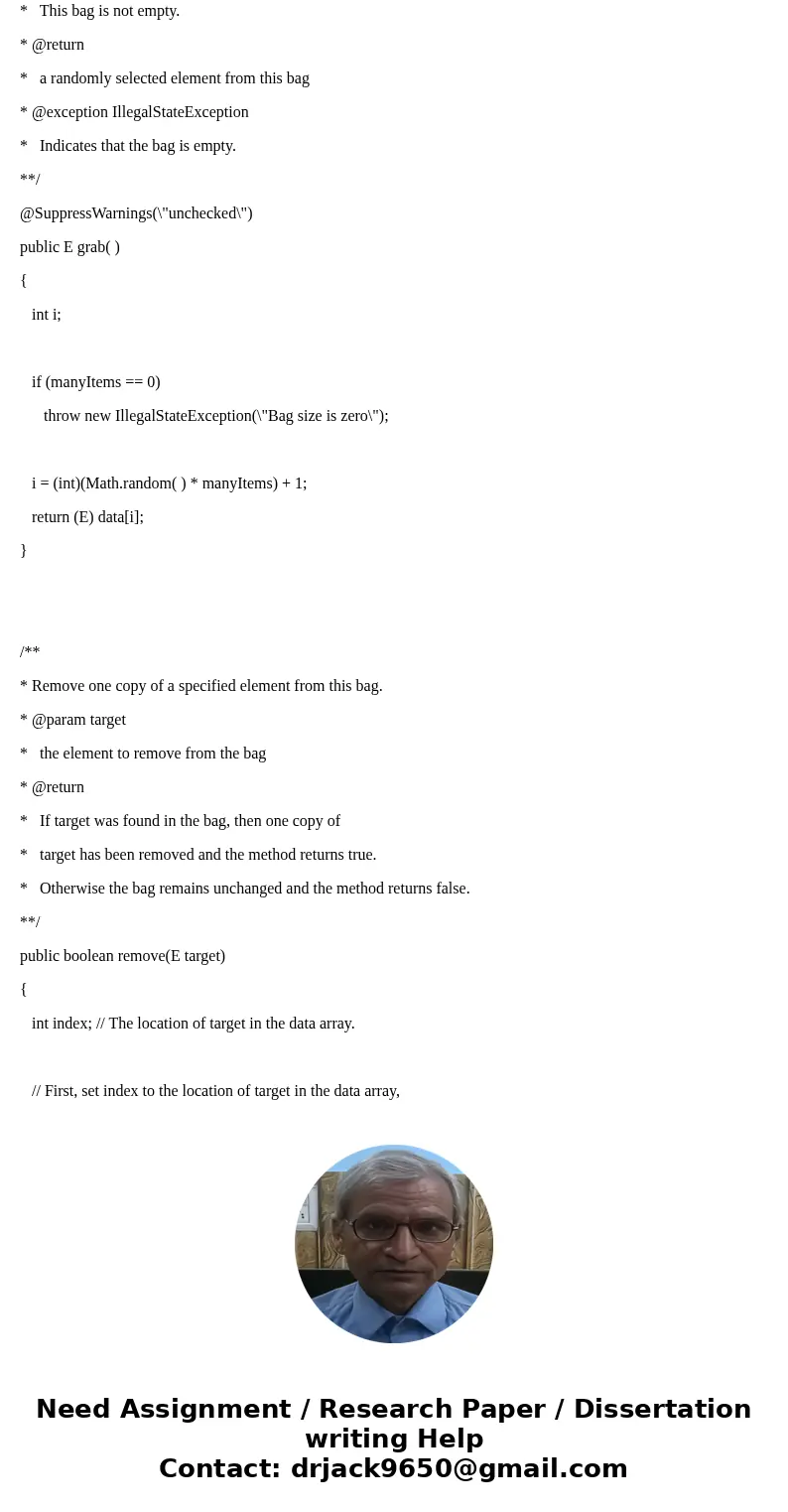
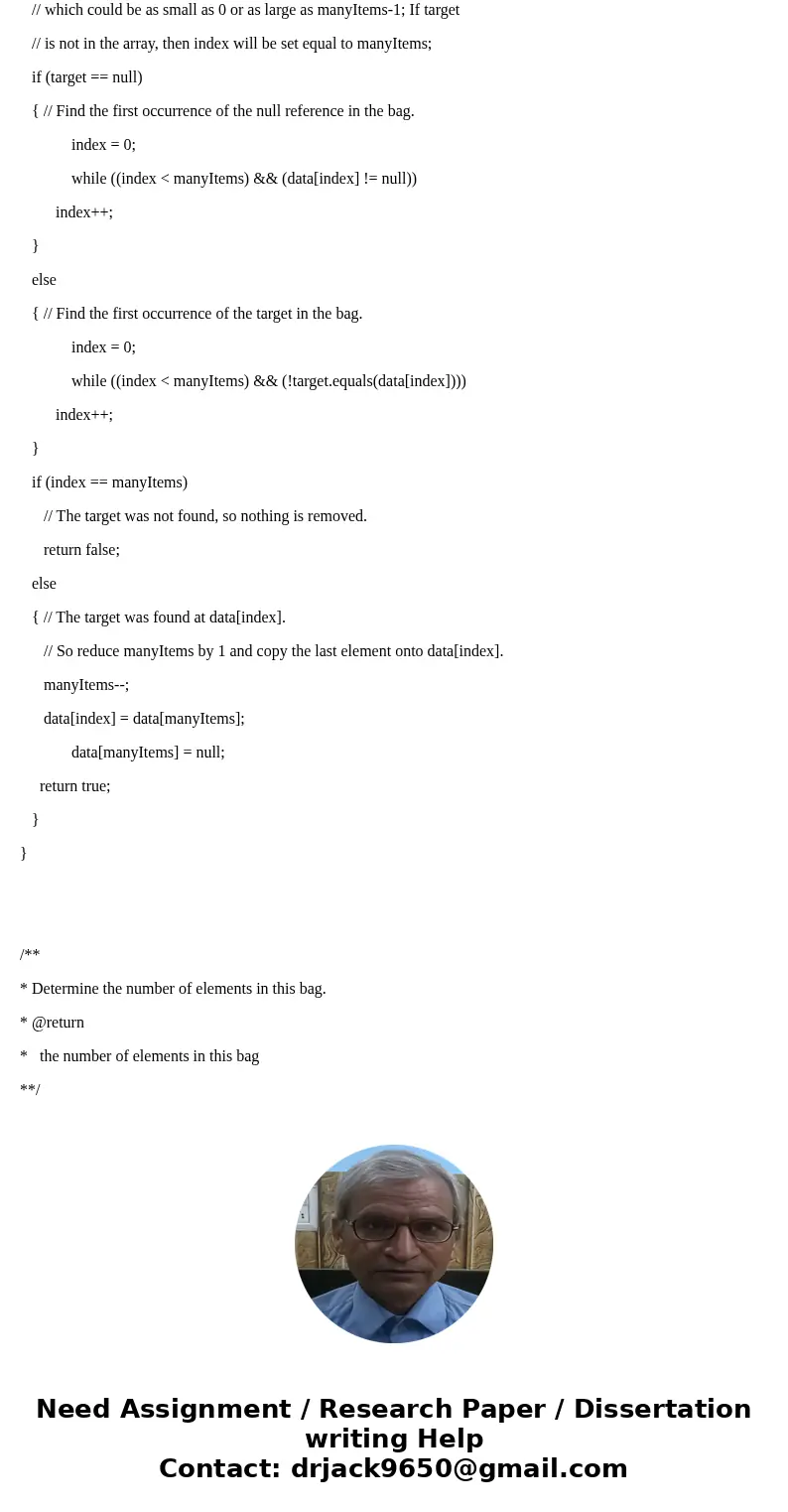
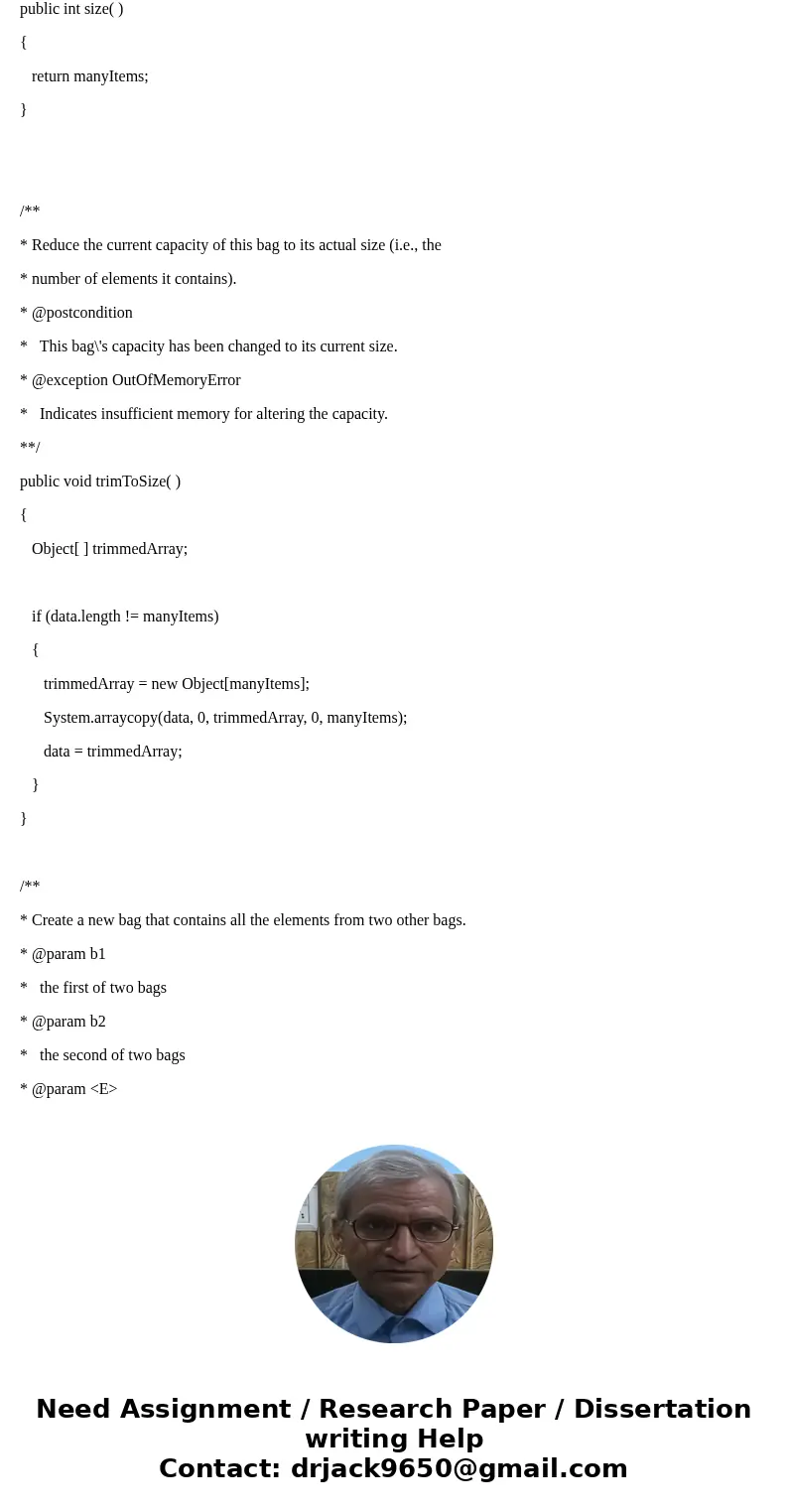
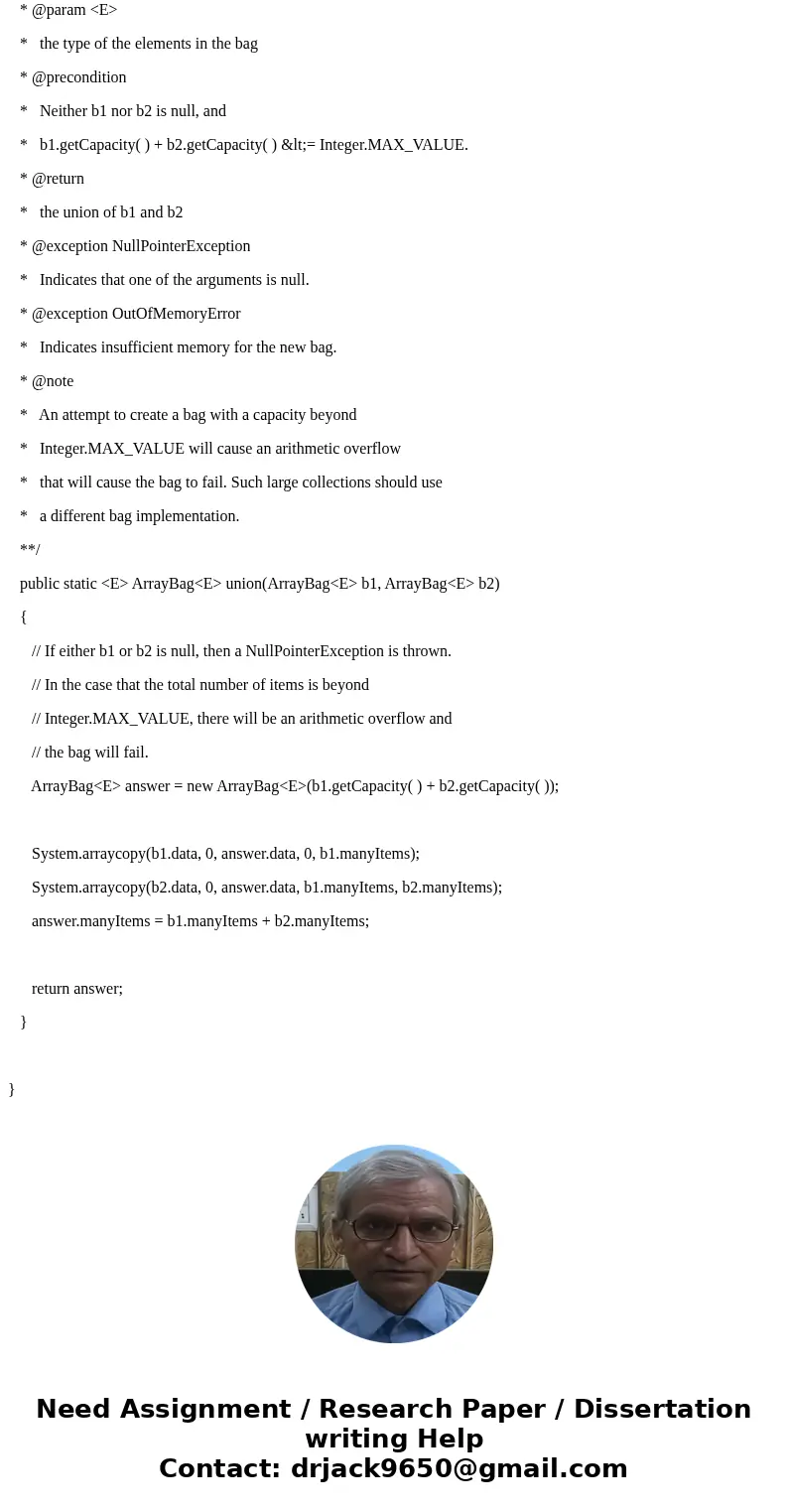
 Homework Sourse
Homework Sourse